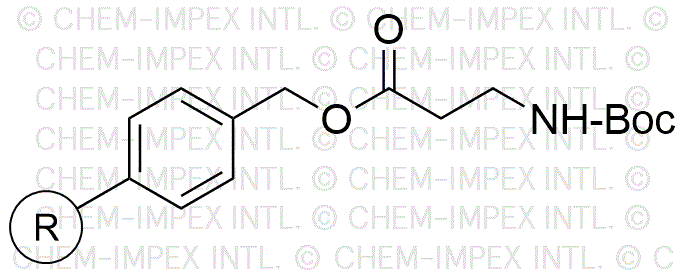Boc-b-alanine Merrifield resin (0.25 - 1.0 meq/g, 100 - 200 mesh) is widely utilized in research focused on:
- Peptide Synthesis: This resin serves as a solid support in the synthesis of peptides, allowing for efficient coupling reactions and easy cleavage of the final product.
- Drug Development: It is used in the development of peptide-based drugs, providing a reliable method for creating compounds with potential therapeutic effects.
- Bioconjugation: The resin facilitates the attachment of biomolecules, such as antibodies or enzymes, to peptides, enhancing their functionality in diagnostic and therapeutic applications.
- Research in Neuroscience: Researchers utilize this resin to create neuropeptides that can help in understanding brain functions and developing treatments for neurological disorders.
- Custom Peptide Libraries: It enables the generation of diverse peptide libraries for screening in various biological assays, aiding in the discovery of new drug candidates.
Informations générales
Propriétés
Sécurité et réglementation
Applications
Boc-b-alanine Merrifield resin (0.25 - 1.0 meq/g, 100 - 200 mesh) is widely utilized in research focused on:
- Peptide Synthesis: This resin serves as a solid support in the synthesis of peptides, allowing for efficient coupling reactions and easy cleavage of the final product.
- Drug Development: It is used in the development of peptide-based drugs, providing a reliable method for creating compounds with potential therapeutic effects.
- Bioconjugation: The resin facilitates the attachment of biomolecules, such as antibodies or enzymes, to peptides, enhancing their functionality in diagnostic and therapeutic applications.
- Research in Neuroscience: Researchers utilize this resin to create neuropeptides that can help in understanding brain functions and developing treatments for neurological disorders.
- Custom Peptide Libraries: It enables the generation of diverse peptide libraries for screening in various biological assays, aiding in the discovery of new drug candidates.
Documents
Fiches de données de sécurité (FDS)
La FDS fournit des informations de sécurité complètes sur la manipulation, le stockage et l’élimination du produit.
Spécifications du produit (PS)
Le PS fournit une description complète des propriétés du produit, notamment sa composition chimique, son état physique, sa pureté et les exigences de stockage. Il détaille également les plages de qualité acceptables et les applications prévues du produit.
Certificats d'analyse (COA)
Recherchez des certificats d'analyse (COA) en saisissant le numéro de lot du produit. Les numéros de lot et de lot se trouvent sur l'étiquette d'un produit, après les mots « Lot » ou « Lot de fabrication ».
Numéro de catalogue
Numéro de lot/série
Certificats d'origine (COO)
Ce certificat d'exploitation confirme le pays dans lequel le produit a été fabriqué, et détaille également les matériaux et composants utilisés et s'il est issu de sources naturelles, synthétiques ou autres sources spécifiques. Ce certificat peut être requis pour les douanes, le commerce et la conformité réglementaire.
Numéro de catalogue
Numéro de lot/série
Fiches de données de sécurité (FDS)
La FDS fournit des informations de sécurité complètes sur la manipulation, le stockage et l’élimination du produit.
DownloadSpécifications du produit (PS)
Le PS fournit une description complète des propriétés du produit, notamment sa composition chimique, son état physique, sa pureté et les exigences de stockage. Il détaille également les plages de qualité acceptables et les applications prévues du produit.
DownloadCertificats d'analyse (COA)
Recherchez des certificats d'analyse (COA) en saisissant le numéro de lot du produit. Les numéros de lot et de lot se trouvent sur l'étiquette d'un produit, après les mots « Lot » ou « Lot de fabrication ».
Numéro de catalogue
Numéro de lot/série
Certificats d'origine (COO)
Ce certificat d'exploitation confirme le pays dans lequel le produit a été fabriqué, et détaille également les matériaux et composants utilisés et s'il est issu de sources naturelles, synthétiques ou autres sources spécifiques. Ce certificat peut être requis pour les douanes, le commerce et la conformité réglementaire.

